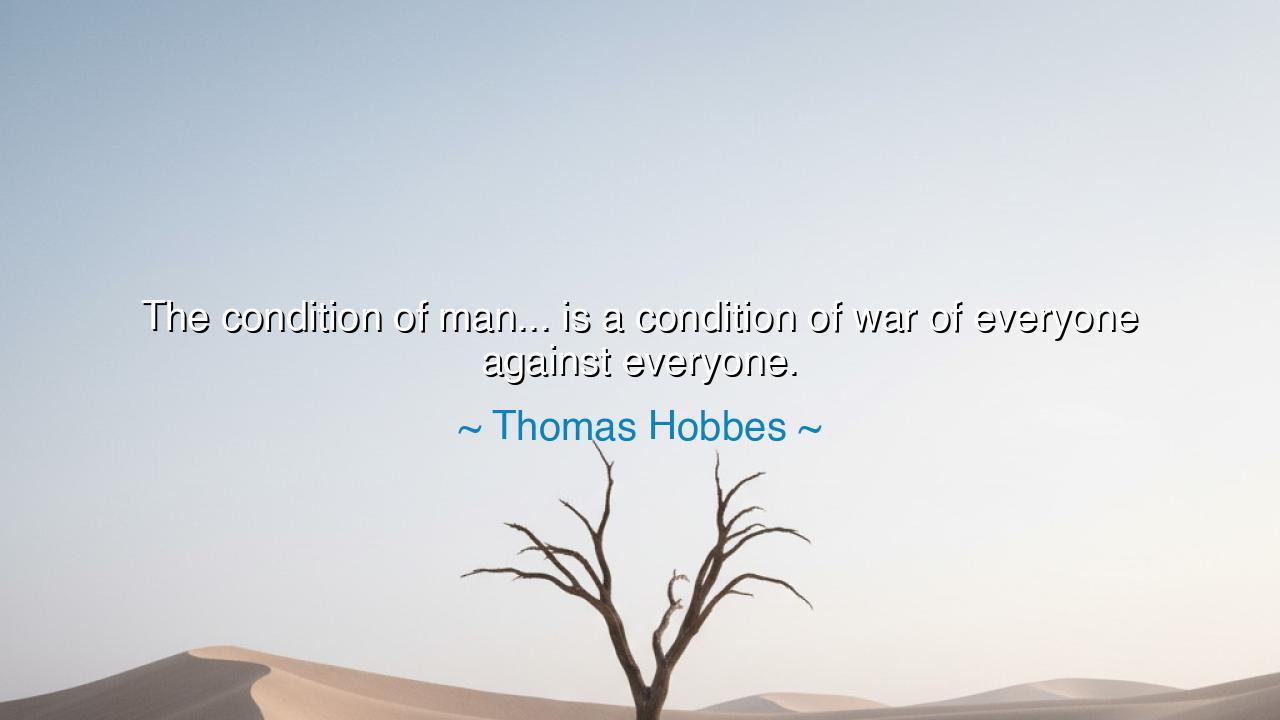
The condition of man... is a condition of war of everyone






Hear, O seeker of wisdom, the grave voice of Thomas Hobbes, who lived through the fires of civil war and beheld the chaos of men ungoverned. He declared: “The condition of man… is a condition of war of everyone against everyone.” In these stark words lies a vision of human nature stripped bare of its ornaments, reduced to the struggle for survival. Hobbes saw that when there is no common power, no law, no order, each man becomes both hunter and hunted. In such a state, life is not noble, but solitary, poor, nasty, brutish, and short.
The origin of this saying lies in Hobbes’s great work, Leviathan, written in 1651 during the aftermath of the English Civil War. He had witnessed neighbor turn against neighbor, families torn apart by allegiance to king or parliament, and fields stained with the blood of civil strife. Out of that crucible, Hobbes forged his grim vision: that the natural condition of mankind is not peace but conflict, not harmony but suspicion, where each man fears the other’s violence, and trust dissolves like mist before the sun.
Consider the fate of societies where law collapses. In the long years of the Rwandan genocide, authority fell away, and communities descended into terror. Friends became enemies, neighbors became executioners, and fear ruled every street. This was Hobbes’s vision made flesh: the war of everyone against everyone, where survival outweighed compassion, and violence bred more violence. Without order, the human heart, pressed by fear, can become a weapon against itself.
Yet Hobbes was not without hope. For though he saw man’s natural state as war, he also believed in man’s capacity to reason. To escape the endless conflict, men join together in covenant, surrendering some freedoms to a sovereign power strong enough to bind them all. Thus is born the social contract, and thus is forged the great Leviathan—the state itself, which holds the sword so that individuals may live in peace. Without such authority, Hobbes warned, liberty becomes license, and license becomes destruction.
The deeper meaning of Hobbes’s words is not only a judgment upon man’s nature, but a call to vigilance. For even in ordered societies, the seeds of the war of all against all lie hidden, waiting to sprout when law weakens or when trust collapses. The fragile threads of civilization must be guarded, for once torn, they reveal the naked condition beneath. His teaching is not meant to condemn humanity without remedy, but to remind us that peace is not natural—it must be built, defended, and renewed in every generation.
What lesson, then, shall we carry into our own lives? It is this: do not take order for granted. Cherish the institutions that restrain violence, however imperfect. Strive to be a builder of trust, not a sower of suspicion. And in your own heart, master the war within, lest you contribute to the war without. For each lie, each betrayal, each act of cruelty feeds the chaos Hobbes described, while each act of honesty, justice, and mercy strengthens the fabric of peace.
Therefore, O listener, heed the wisdom of Hobbes. Remember that beneath the thin veil of civilization lies the ever-present possibility of conflict. Guard against it not only with strong laws, but with strong virtue. For though man’s condition may be war, his calling is to rise above it—to choose covenant over chaos, reason over fear, and peace over destruction. And in that choice lies the hope of humanity’s survival.






AA05 Acc ao
This quote raises the question of whether Hobbes was describing an eternal truth about humanity or simply reflecting on the chaotic times in which he lived. If human life is truly one of constant war, what does that mean for our ability to work together toward common goals? In a world that seems increasingly divided, can Hobbes' view still hold relevance, or is it time to reconsider what motivates human behavior beyond conflict?
BVBao Vi
Hobbes’ assertion that life is essentially a battle between individuals presents a rather pessimistic view of human nature. But in today’s interconnected world, are we still truly in a constant state of war with each other? Could it be that the condition Hobbes describes is more about competition than actual warfare, and that modern society’s efforts toward diplomacy and cooperation have softened this inherent conflict?
TQHong Tran Quang
Hobbes' quote feels quite bleak, suggesting that we are all locked in a struggle against one another. But is this perspective valid, or has it been influenced by the turmoil of Hobbes’ own time? In today’s world, with global interconnectedness and rising social movements for justice, can we argue that cooperation and unity are becoming more defining features of humanity than conflict? How do we reconcile this with the nature of politics and power?
KBTran Khanh Bang
Hobbes’ view of human nature as a state of constant conflict is intriguing, but does it still apply to modern society? While we see individuals and groups in competition, is it possible that Hobbes oversimplified the human condition? Could human cooperation and empathy, which seem to be growing in many areas, challenge his view of humanity as inherently at war with itself? How much of our nature is truly about conflict, and how much is about connection?